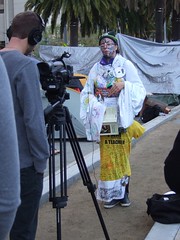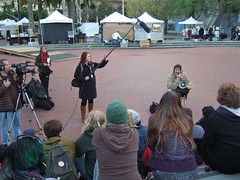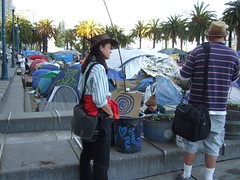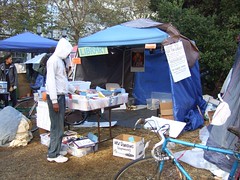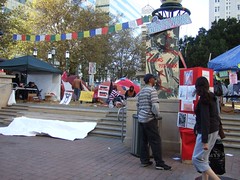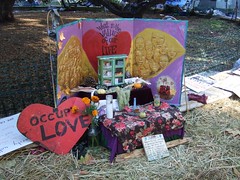Occupying Myself
Sometime last year I read an article by a psychologist about the historical impact of a recession job market on college graduates and how the government needed to do something about jobs now because otherwise we would create a whole generation of young people who would break off from the mainstream and stop believing in the system. My first thought was "Why on earth do we want yet another batch of young people who believe in the system when things are so bad already. This, after all, is the exploitive, growth oriented system that was fleecing us all for every last dollar and natural resource."
Then I realized, with a flash of recognition, that I was in college during one of the worse recession years of the'70s and the slim pickings in jobs was something I would never forget. Here then, was an explanation for why I grew up to be such a malcontent!
Of course, there was more to it for me, my birthright and sexual orientation having landed me in a precarious geography of amorphous identity. There were, however, two distinct and conflicting sentiments that led to my awakening. The first was the idea that a college education would match my appetite for knowledge with meaningful work that would result in a respectful career as a professional of some sort and a respectable income. This was how it had happened for my parents. The problem was that I didn't believe in most of what was being taught in school even at the very liberal, no grades campus of U.C. Santa Cruz. All I could discern was that each discipline held a narrow view of the world and not one of those world views had a place for a cross cultural, non-Western, gender bending, female empowered perspective. The knowledge I was being exposed to simply wasn't relevant to me.
So I asked my mother why did I even need to get a college degree?
"So, you can live in the manner to which you have become accustomed," she said pleased to quote this witty truism.
My mother's answer led to my second revelation. Obviously I needed to become accustomed to a lifestyle that was a whole lot less pricey. My parents worked hard in their fields. Too hard I felt. We also worked hard at the leisure end of it too, driving to the mountains in the winter for the rush of downhill skiing, maintaining a boat so we could sail in the summer, keeping the pool and the house clean so we could entertain at our own home. I didn't want to work that hard just to get to the point of working harder, especially since none of those professions looked kindly on homosexuals in their ranks. And the closeted ones already there were trading self-oppression for privileges. I had already spent three years in the closet in high school and the constant vigilance at so young an age made me long for freedom. Freedom from these Faustian bargains. I dropped out of college.
(I did eventually finish a college degree, a queer friendly one in graphic design; one I could afford on my own at a state university, while working nights at a movie theatre and living at home. I didn't want to be branded a loser just for not finishing school.)
If It's Already Broken...
For the crop of students who have now become a phenomenal people's movement called Occupy Wall Street, the above psychologist's warning was quite prophetic. When OWS burst on the scene in a way that could no longer be ignored, it confounded the mainstream media. What were these privileged kids on about? I too wondered. Was it just about jobs, given those crippling college loans? But too many jobs were Faustian bargains with the environment.
From early articles about what OWS, I was pleased to see how quickly they were learning to be an inclusive movement. On Facebook, contacts began to post edifying charts and graphics about who were the 1% and who were the 99% and how it got that way. (Wow our gap between rich and poor is bigger than nearly everyone in the world!) In a matter of weeks all the old lefty radicals were coming out of the closet, daring to voice anti-capitalist sentiments that had long been suppressed for the sake of corporate funding to their pet environmental and social justice non-profits. Our top speakers and writers paid visits to New York to give teach-ins through the human megaphone. Every lefty cause jumped on the Occupy wagon with its agenda; we all understood that the system was broken. That no serious demands could be addressed through the usual democratic process. Obama had been our hope, but he too, was completely beholden to moneyed interests (just as Clinton had been).
"I told you that people needed to get in the streets," said Catherine. Yes we'd been needing to get in the streets forever, but had long been too comfortable and too amused by our many toys. The planet being destroyed wasn't enough. Polar bear starvation and whales tortured by sonic discharges not enough. Islands of plastic in the ocean not enough (and still largely a well kept secret). Entire villages in the developing world poisoned by corporate pollution not enough. Jobs sent overseas to exploited cheap labor not enough. Healthcare only for the healthy not enough. Poisoned food not enough. Tap water made flammable by frakking not enough. Oil spills not enough. Unjust wars not enough. Just plain moral outrage not enough.
And besides marching didn't seem to do anything. It was just a way to show the international community that we weren't all asleep. It never occurred to me that we would have to camp out. We weren't homeless. But here we had a group of largely white, middle-class, college graduates fed up enough to live in tents. I never in my wildest hopes saw it coming. I believed that such youth lived in the safety of a virtual world, were too absorbed to go outside, let alone sleep in it. They were digital natives as one colleague calls them.
Camp Occupy
As an aficionado of urban camping, I had to see how it was being done. I contacted, Stacy, my fellow camper and we zipped downtown on Muni. As we entered the Justin Herman Park near downtown San Francisco, a man in a motorcycle jacket came out of his sizable tent to greet us. He was a troubadour he told us and it was his aim to be of benefit to the celebratory atmosphere of the camp, entertain tourists and add to the general bonhomie, he said. As Stacy humored him I stood watching a man in a polo shirt and chinos, pulling a rolling suitcase. He asked me if I knew who Geng was. I had no idea, naturally, and pointed to campers he could ask—white guys like him, but dressed as though for combat at a music festival.
Stacy and I took a circuit of the camp, We noted the many porta potties reeking of pinesol, the garden of vegetable plants and the catering tent busy with volunteers. Outside a white board offered classes in making sauerkraut and chinese noodles. I was particularly heartened by the talk on urban homesteading. A dog sat on a white pouf outside a tent; inside his mistress lay reading a hardback book. Rounding the corner we came upon a man listening to tunes from his laptop with portable speakers. He told us about the lamppost where you could plug into an outlet. We explored the communication tent that supported the camp's website and Facebook page. Inside sat a bearded man at a laptop. Next to him an Asian man peddling the bicycle powered generator connected to a sealed lead acid battery. As we left I saw the newcomer, his rolling suitcase in the care of a handsome multi-racial man with long black hair. They were working their way to a tent bearing a sign that said "bag check".
As we walked back up Market Street to catch the bus, we came upon the original Occupy encampment in front of the Federal Reserve building and noted the many political placards in the planter boxes. "Living Unsustainably is Self-Destruction", said one. "Tax the Rich," said another.
Two days later I had a client in Oakland. My client and her partner were pleased to report having been part of the march two days ago. After finishing my work for the day, I took the opportunity to visit Oakland Occupy, now famous for their run-in with police followed by the very successful general strike and the aforementioned march.
I emerged from the BART station a block from Frank Ogawa plaza. The entrance was marked by an altar to the marine who lay in the hospital following the blow to his head from a canister thrown by police, the night of the recent raid. At the front of the camp sat several white guys next to a sign that read "Tobacco donations here". I stopped at a pop-up shelter at the entrance to the plaza and spoke to two women, one black one white, sitting at a table under a sign that encouraged people to volunteer for services. Apparently no services were in demand, but something of an educational or self-care nature was encouraged. They offered me a free paper from an organization working for housing and racial justice.
As I walked into the camp on the newly laid hay (the original lawn having turned to mud), I noted the very different atmosphere from Occupy SF. Where SF had a familiar Green Festival atmosphere, Oakland had something fresh and edgy about it as if a village had sprung up of newly empowered people who were now busy helping themselves. I walked past a group of black men putting up a tent. At the library tent a white board had a long list of requested lefty authors. In the back corner, someone had built a hexayurt, a structure popular at Burning Man festivals, made from insulation board taped together with extra wide strapping tape. A sign on it said it was "A Red Tent" to honor the sacred feminine. A white woman in a sweater and boots stepped out of it. She invited me to come inside explaining that it was a woman only space; she showed me her pile of bedding. She had been there a week, was likely homeless before; she was accompanied by her chihuahua Elvis. I did not ask why Elvis was permitted in a woman-only space.
On the other side of the camp was a childcare tent where two children and their mother played with the toys laid out on a living room size rug. A gender-bending musician sang to a small crowd at a PA system on the steps of the city hall. Down the stairs on the right, a kitchen crew was busy preparing food for a line that was already forming. Before I left I stopped at a table loaded with donated clothes. A white woman in a bicycle helmet was busy folding and putting the clothes into categories. I stopped to lend a hand, wanting to participate in some way. She told me she lived nearby and came everyday because it was such a happening place. Yes it was magical in a Brigadoon sort of way, for the threat of eviction was a constant tension at the Occupy camps.
Oakland police had a recent history of acting rashly in a city fraught with problems and starved for cash. Later I would read that desirable public space in Oakland and other cities was now in the control of absentee corporate real estate interests. These interests feed the city with a specialized tax money earmarked to maintain a downtown area conducive to business. They were also given the power to specify how that tax money was used. (Don't we all wish we had that right?) And now they were demanding the police clear the camp. They also had the power to hire private security forces called Block by Block, a sort of Blackwater force for urban security. Mayor Quan was taking the blame for weak leadership. She may have supported Occupy, but her hands were already tied.
Change In The Air
For Americans the Occupy Movement has transformed the national dialogue dramatically. No longer will the notion of lowering taxes on the rich to raise all boats be the accepted wisdom. But the biggest crime of our financial system is still to be understood. For it is not just that the 1% refuses to share their wealth with the other 99%, it is that they have created a financial system that gives the illusion that there is so much wealth to be had in the first place. So focused are we on the power of invested money to make money that our financial system has completely lost touch with reality—with the actual physical world.
Societies used to survive hard times—wars, famine, et al—by setting aside enough grain to feed the population for the duration. The appetite of investors for real world resources has taken such food reserves, through international treaties like GATT, and thrown them on the table to play with. As with other "commodities" like forests, oil and clean water, all are bid up and made into trash as fast as possible with no sense of how long it takes to renew those resources (if they are renewable) and no back-up plan if they aren't. And that is scary. Not only are we leaving nothing for future generations, we don't even know if we are leaving enough for ourselves.
We have a system with no feedback loop to warn us when we are doing irrevocable harm to the planet. Investors are positively rewarded by rising prices to buy until a bubble bursts. And when the bubble does burst we have more of something than we know what to do with. (I know I help people throw it away. And bigger stuff like the empty condos in Bangkok that I saw on my last trip.) This overproduction of everything, making trash out of resources as fast as the market will bear, plus the pollution and carbon footprint it took to produce these items, is planned obsolescence on a planet threatening scale.
As the Occupy camps are evicted, the movement has declared that they are an idea whose time has come. Indeed there is astrological precedence for such a vetting of corporations, government, and other patriarchal institutions. The last time the planets and stars were aligned thus was during that other era of protest—the Sixties. Already the comparisons are being made. Occupy has set a mood for stripping away falsehoods and testing the viability of all our social system. There is no end to the things we could examine. I can hardly wait.
Labels: liberation, Occupy, protest
